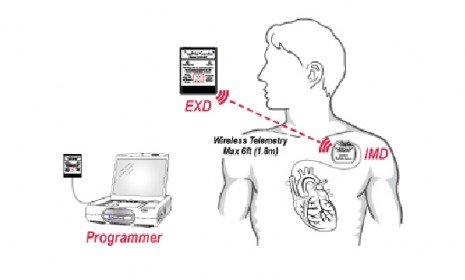The implant that alerts you before a heart attack
Heart disease kills more than 2,200 Americans every day, but an innovative new warning system could help reduce that number substantially

A free daily email with the biggest news stories of the day – and the best features from TheWeek.com
You are now subscribed
Your newsletter sign-up was successful
A new device that acts as an early warning system aims to curb the number of heart attack deaths in older adults. The AngelMed Guardian implant, which is featured in an upcoming issue of the journal Ergonomics in Design, could potentially save thousands of lives a year. But how does the high tech warning system work? Here, a guide:
How does it work?
The device is surgically implanted under the skin like a pacemaker or defibrillator. Once it's in place, the AngelMed Guardian alerts the patient to an oncoming attack with vibrations, audible tones, and flashing warning lights beamed to an external, pager-like device. There are two alarm levels: Low-priority and high-priority. A low-priority warning signals that something might be wrong, so the patient should visit a doctor within 48 hours. The high-priority alarm goes off when a patient is having a heart attack.
The Week
Escape your echo chamber. Get the facts behind the news, plus analysis from multiple perspectives.

Sign up for The Week's Free Newsletters
From our morning news briefing to a weekly Good News Newsletter, get the best of The Week delivered directly to your inbox.
From our morning news briefing to a weekly Good News Newsletter, get the best of The Week delivered directly to your inbox.
How can the device reduce heart attack deaths?
The most significant factor in the high number of heart attack deaths in the U.S. — heart disease kills more than 2,200 Americans every day — is that most victims "normally do not have any warning symptoms" or fail to recognize that they're having a heart attack before it's too late, says My Health Bowl. That's where the AngelMed Guardian would come in.
Don't some defibrillators already have a warning system?
Some do, yes. But because the AngelMed Guardian uses a combination of vibrations, tones, and visual warnings it's better at alerting the patient than an implanted defibrillator, says Elvis Augustin at Doctor Tipster. The vibration can still grab a user's attention even if he or she is wearing several layers of clothing or has hearing problems.
A free daily email with the biggest news stories of the day – and the best features from TheWeek.com
And this thing has proved effective?
Preliminary studies with elderly patients demonstrated that they could tell the difference between the two types of warnings easily. Patients responded particularly positively to the redundancy of the simultaneous light, sound, and vibration warnings. The high tech device is still in the clinical testing phase (with no timeline for FDA approval yet), and currently costs $13,000 to have implanted.
Sources: CBS News, Doctor Tipster, My Health Bowl, Ubergizmo
-
 The Week contest: AI bellyaching
The Week contest: AI bellyachingPuzzles and Quizzes
-
 Political cartoons for February 18
Political cartoons for February 18Cartoons Wednesday’s political cartoons include the DOW, human replacement, and more
-
 The best music tours to book in 2026
The best music tours to book in 2026The Week Recommends Must-see live shows to catch this year from Lily Allen to Florence + The Machine